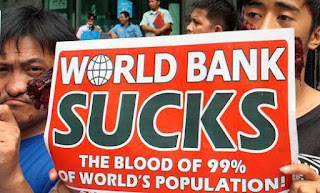The World Bank and the International Monetary Fund (IMF) are two international financial institutions that were established with the noble aim of fostering global economic stability and reducing poverty in developing countries. However, over the years, these organizations have faced mounting criticism for the negative impact they often have on the very countries they are meant to assist. This article delves into how the World Bank and the IMF have been accused of contributing to the destruction of poor nations, and why reforms are desperately needed to ensure a more equitable and sustainable future for these countries.
The Structural Adjustment Programs
One of the most significant criticisms of the World Bank and IMF centers around the implementation of Structural Adjustment Programs (SAPs). These programs, which were initiated in the 1980s, required borrowing nations to adopt a series of economic reforms in exchange for financial assistance. While these reforms were aimed at stabilizing economies, they often came at a heavy cost to the citizens of these nations.
Under SAPs, countries were often forced to reduce government spending on social services like healthcare and education. Subsidies for basic necessities, such as food and fuel, were cut, leading to rising prices and increased hardship for the poor. Moreover, these programs frequently mandated privatization of state-owned enterprises, often resulting in foreign corporations benefiting at the expense of local industries and jobs.
Debt Trap Diplomacy
Another concerning issue associated with the World Bank and IMF is what's known as "debt trap diplomacy." Developing nations are often lured into taking out loans with favorable terms from these institutions, but they can quickly find themselves trapped in a cycle of debt. The loans often come with stringent conditions, including austerity measures and market liberalization policies that can hinder a nation's long-term development.
As countries struggle to repay their loans, they are compelled to take on more debt, further exacerbating their financial woes. This cycle can make these nations dependent on the World Bank and IMF, effectively surrendering their economic sovereignty.
Lack of Accountability
Critics argue that the World Bank and IMF lack sufficient transparency and accountability. Decision-making within these institutions is often dominated by wealthy countries, which wield disproportionate influence, and the interests of the poorest nations are frequently sidelined. The lack of accountability has led to situations where projects funded by these organizations have had devastating environmental and social consequences.
Reforms and a Path Forward
It is clear that significant reforms are necessary to ensure that the World Bank and IMF fulfill their original mission of reducing poverty and fostering sustainable development in developing countries. Some proposed reforms include:
Greater Representation: Ensuring that the interests of developing nations are adequately represented in the decision-making processes of these institutions.
Debt Relief: Implementing policies that allow heavily indebted nations to escape the cycle of debt without severe economic consequences.
Transparency: Improving transparency and accountability to prevent corruption and ensure that projects funded by these institutions do not harm local communities or the environment.
Balanced Conditionality: Revising the conditions attached to loans and assistance to prioritize the welfare of the people in borrowing nations over strict economic reforms.
Conclusion
The World Bank and the IMF were founded with the laudable goal of reducing poverty and fostering development in struggling nations. However, they have often been accused of contributing to the destruction of these very nations through policies such as Structural Adjustment Programs and debt trap diplomacy. It is essential that these organizations undergo significant reforms to ensure that they truly serve the best interests of the developing countries they aim to assist. Only with greater accountability, transparency, and a more equitable distribution of power can the World Bank and the IMF become forces for good in the global economic landscape.


